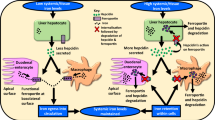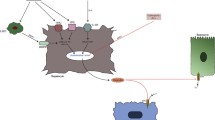Abstract
Purpose
We aimed to assess expression of ten iron-regulatory genes in hepatocellular carcinoma (HCC) and its clinical implications.
Methods
We used real-time polymerase chain reaction to measure ten iron-regulatory genes’ mRNA and Perls’ stain to assess iron stores in 50 HCCs and adjacent nontumor specimens. We compared the differences of gene expression and iron stores between tumor and nontumor specimens, and analyzed the relationships of gene expression with hepatic iron stores, patients’ hemoglobin levels and clinicopathologic parameters.
Results
Hepcidin, ceruloplasmin, transferrin, and transferrin receptor 2 were downregulated, while transferrin receptor 1 was upregulated in HCC. Hepcidin was markedly decreased in HCC but still correlated with hepatic iron stores. Iron-regulatory genes varied in their relationships of expression with clinicopathologic parameters.
Conclusions
Altered expression of iron-regulatory genes in HCC may disturb patient’s iron balance. Hepcidin may play a role in defending the body against HCC.


Similar content being viewed by others
References
American Joint Committee on Cancer (1997) AJCC cancer staging manual. Lippincott-Raven, Philadelphia
Anderson GJ, Frazer DM (2005) Hepatic iron metabolism. Semin Liver Dis 25:420–432. doi:10.1055/s-2005-923314
Andrews NC (2004) Anemia of inflammation: the cytokine–hepcidin link. J Clin Invest 113:1251–1253
Andrews NC, Schmidt PJ (2007) Iron homeostasis. Annu Rev Physiol 69:69–85. doi:10.1146/annurev.physiol.69.031905.164337
Aoki CA, Rossaro L, Ramsamooj R, Brandhagen D, Burritt MF, Bowlus CL (2005) Liver hepcidin mRNA correlates with iron stores, but not inflammation, in patients with chronic hepatitis C. J Clin Gastroenterol 39:71–74
Bergmann OM, Mathahs MM, Broadhurst KA et al (2008) Altered expression of iron regulatory genes in cirrhotic human livers: clues to the cause of hemosiderosis? Lab Invest 88:1349–1357. doi:10.1038/labinvest.2008.95
Beutler E, Gelbart T, Lee P, Trevino R, Fernandez MA, Fairbanks VF (2000) Molecular characterization of a case of atransferrinemia. Blood 96:4071–4074
Bridle KR, Frazer DM, Wilkins SJ, Dixon JL, Purdie DM, Crawford DHG et al (2003) Disrupted hepcidin regulation in HFE-associated haemochromatosis and the liver as a regulator of body iron homoeostasis. Lancet 361:669–673. doi:10.1016/S0140-6736(03)12602-5
Bridle KR, Cheung TK, Murphy TL, Walters MM, Anderson GJ, Crawford DHG et al (2006) Hepcidin is down-regulated in alcoholic liver injury: implications for the pathogenesis of alcoholic liver disease. Alcohol Clin Exp Res 30:106–112. doi:10.1111/j.1530-0277.2006.00002.x
Courselaud B, Troadec M-B, Fruchon S, Ilyin G, Borot N, Leroyer P et al (2004) Strain and gender modulate hepatic hepcidin 1 and 2 mRNA expression in mice. Blood Cells Mol Dis 32:283–289. doi:10.1016/j.bcmd.2003.11.003
Detivaud L, Nemeth E, Boudjema K, Turlin B, Troadec MB, Leroyer P et al (2005) Hepcidin levels in humans are correlated with hepatic iron stores, hemoglobin levels, and hepatic function. Blood 106:746–748. doi:10.1182/blood-2004-12-4855
Deugnier YM, Charalambous P, Lequilleuc D, Turlin B, Searle J, Brissot P et al (1993) Preneoplastic significance of hepatic iron-free foci in genetic hemochromatosis: a study of 185 patients. Hepatology 18:1363–1369
Fujita N, Sugimoto R, Takeo M, Urawa N, Mifuji R, Tanaka H et al (2007) Hepcidin expression in the liver: relatively low level in patients with chronic hepatitis C. Mol Med 13:97–104. doi:10.2119/2006-00057.Fujita
Harris ZL, Takahashi Y, Miyajima H, Serizawa M, MacGillivray RT, Gitlin JD (1995) Aceruloplasminemia: molecular characterization of this disorder of iron metabolism. Proc Natl Acad Sci USA 92:2539–2543. doi:10.1073/pnas.92.7.2539
Hayashi A, Wada Y, Suzuki T, Shimizu A (1993) Studies on familial hypotransferrinemia: unique clinical course and molecular pathology. Am J Hum Genet 53:201–213
Hirohashi S, Ishak KG, Kojiro M, Wanless IR, Theise ND, Tsukuma H (2000) Hepatocellular carcinoma. In: Hamilton SR, Aaltonen LA et al (eds) World Health Organization classification of tumors, pathology and genetics of tumors of the digestive system. IARC Press, Lyon, pp 165–166
Holmstrom P, Gafvels M, Eriksson LC, Dzikaite V, Hultcrantz R, Eggertsen G et al (2006) Expression of iron regulatory genes in a rat model of hepatocellular carcinoma. Liver Int 26:976–985. doi:10.1111/j.1478-3231.2006.01316.x
Kijima H, Sawada T, Tomosugi N, Kubota K (2008) Expression of hepcidin mRNA is uniformly suppressed in hepatocellular carcinoma. BMC Cancer 8:167. doi:10.1186/1471-2407-8-167
Kwok JC, Richardson DR (2002) The iron metabolism of neoplastic cells: alterations that facilitate proliferation? Crit Rev Oncol Hematol 42:65–78. doi:10.1016/S1040-8428(01)00213-X
Loreal O, Turlin B, Pigeon C, Moisan A, Ropert M, Morice P et al (2002) Aceruloplasminemia: new clinical, pathophysiological and therapeutic insights. J Hepatol 36:851–856. doi:10.1016/S0168-8278(02)00042-9
Nemeth E, Tuttle MS, Powelson J, Vaughn MB, Donovan A, Ward DM et al (2004) Hepcidin regulates cellular iron efflux by binding to ferroportin and inducing its internalization. Science 306:2090–2093. doi:10.1126/science.1104742
Nicolas G, Bennoun M, Devaux I, Beaumont C, Grandchamp B, Kahn A et al (2001) Lack of hepcidin gene expression and severe tissue iron overload in upstream stimulatory factor 2 (USF2) knockout mice. Proc Natl Acad Sci USA 98:8780–8785. doi:10.1073/pnas.151179498
Nicolas G, Chauvet C, Viatte L, Danan JL, Bigard X, Devaux I et al (2002) The gene encoding the iron regulatory peptide hepcidin is regulated by anemia, hypoxia, and inflammation. J Clin Invest 110:1037–1044
Ohtake T, Saito H, Hosoki Y, Inoue M, Miyoshi S, Suzuki Y et al (2007) Hepcidin is down-regulated in alcohol loading. Alcohol Clin Exp Res 31:2S–8S. doi:10.1111/j.1530-0277.2006.00279.x
Pietrangelo A (2006) Hereditary hemochromatosis. Annu Rev Nutr 26:251–270. doi:10.1146/annurev.nutr.26.061505.111226
Pigeon C, Ilyin G, Courselaud B, Leroyer P, Turlin B, Brissot P et al (2001) A new mouse liver-specific gene, encoding a protein homologous to human antimicrobial peptide hepcidin, is overexpressed during iron overload. J Biol Chem 276:7811–7819. doi:10.1074/jbc.M008923200
Roetto A, Papanikolaou G, Politou M, Alberti F, Girelli D, Christakis J et al (2003) Mutant antimicrobial peptide hepcidin is associated with severe juvenile hemochromatosis. Nat Genet 33:21–22. doi:10.1038/ng1053
Roy CN, Mak HH, Akpan I, Losyev G, Zurakowski D, Andrews NC (2007) Hepcidin antimicrobial peptide transgenic mice exhibit features of the anemia of inflammation. Blood 109:4038–4044. doi:10.1182/blood-2006-10-051755
Schmittgen TD, Livak KJ (2008) Analyzing real-time PCR data by the comparative CT method. Nat Protoc 3:1101–1108. doi:10.1038/nprot.2008.73
Searle J, Leggett BA, Crawford DHG, Powell LW (2002) Iron storage diseases. In: MacSween RNM, Burt AD, Portman BC, Ishak KG, Scheuer PJ, Anthony PP (eds) Pathology of the liver, 4th edn. Churchill Livingstone, London, pp 257–272
Tseng HH, Hwang YH, Yeh KT, Chang JG, Chen YL, Yu HS (2009) Reduced expression of C/EBPalpha protein in hepatocellular carcinoma is associated with advanced tumor stage and shortened patient survival. J Cancer Res Clin Oncol 135:241–247
Weinstein DA, Roy CN, Fleming MD, Loda MF, Wolfsdorf JI, Andrews NC (2002) Inappropriate expression of hepcidin is associated with iron refractory anemia: implications for the anemia of chronic disease. Blood 100:3776–3781. doi:10.1182/blood-2002-04-1260
Acknowledgments
The study was supported by the National Science Council under the grant of NSC 94-2320-B-039-019 and NSC94-2320-B-039-020.
Author information
Authors and Affiliations
Corresponding author
Rights and permissions
About this article
Cite this article
Tseng, HH., Chang, JG., Hwang, YH. et al. Expression of hepcidin and other iron-regulatory genes in human hepatocellular carcinoma and its clinical implications. J Cancer Res Clin Oncol 135, 1413–1420 (2009). https://doi.org/10.1007/s00432-009-0585-5
Received:
Accepted:
Published:
Issue Date:
DOI: https://doi.org/10.1007/s00432-009-0585-5




